RMT has raised many issues with London Underground management about the way that the company treats staff who are off sick. Several of them are listed here, with the union's view and management's response. This summary is provided by London Underground management.
Issue - Length of warning ‘up to’ 26/52 weeks
Trade Union Line - Insufficient / no discretion being applied
Management Response - Attendance warnings will generally be for 26 or 52 weeks, however should the Local Manager decide at the LDI there are exceptional reasons then the length of warning can be reduced but this would need to be justified and documented. This approach provides consistency and prevents discrimination.
Issue - Double Jeopardy
Trade Union Line - Issuing warning for an item under patterning that has already been used to issue an AAW warning is double jeopardy
Management Response - We agree, the same item of non-attendance cannot trigger both a patterning warning and an item warning. However, an item of non-attendance previously included in a warning can be used to demonstrate an emerging pattern and to draw the employees attention to that pattern. If there is then another item that confirms the pattern a referral to disciplinary for patterning can happen. 3 instances of non-authorised absence constitutes a pattern.
Issue - Issuing 52 week AAW warning for first offence
Trade Union Line - Support pack indicates first offence must have 26 week oral warning
Management Response - We agree that for a first offence under AAW procedure the 26 week warning should be the norm. However, the support pack includes the words ‘you will normally consider’ and this indicates a clear intention that management can advance to a written 52 week warning for a first offence for exceptional reasons. We would expect these reasons to be justified and documented, e.g., someone with a history of avoiding further absence until just beyond the expiry of previously issued 26 week warnings.
Issue - Minor invasive surgery
Trade Union Line - Should exclude MIS items, otherwise encourage individuals to remain absent pending such surgery
Management Response - Urgent MIS will not count, but management have scope to count MIS that is not deemed to be urgent or essential. Commonsense has to apply, we do not want to penalise staff who have no choice in the treatment and where there is a delay outside of their control. OH advice should be sought if time taken off for MIS seems excessive. Below is guidance that reflects the outcome of further joint APC discussions*
Issue - Contact of staff off sick
Trade Union Line - Unreasonable contact by telephone amounts to bullying
Management Response - We expect both management and the individual to agree at the outset appropriate contact arrangements in accordance with 2.2 in the AAW Procedure and to be reasonable in their expectations (for example, if absence is certificated from the outset and clearly going to extend, the level of required contact should take this into account). Failure to agree reasonable contact arrangements, or a failure to comply with required contact arrangements, will result in management having to take the lead. If there is no response to initial telephone contact, a letter should be sent to their registered home address.
Issue - Everything progressing to LDI/CDI
Trade Union Line - No discretion being applied, management instruction that action must be taken
Management Response - There is no instruction that everything is to proceed to LDI/CDI, there is an expectation that all items are investigated and a decision taken as to whether action (formal or informal) is necessary.
Issue - TU rep in sickness review meetings
Trade Union Line - Holding sickness review meetings early to deny TU representation or while the individual is at work
Management Response - Presuming the employee wishes to be accompanied at a sickness review meeting, TU representation rights are clear – for meetings in connection with any absence that has exceeded 28 days or is likely to exceed 28 days. Management are not however prevented from holding review meetings earlier for identified reasons (welfare, duty of care), or for reviewing past attendance while the employee is at work. However, such meetings should not be arranged earlier than 28 days simply to avoid a TU presence. No formal action (reasonable adjustments under the DDA, referral to redeployment, medical termination etc) can result from informal meetings.
Issue - Local sickness reporting procedures
Trade Union Line - These exceed agreements and should not do so.
Management Response - Managers are not prevented from clarifying how agreed arrangements translate locally into practice, but these should not contradict AAW and sickness reporting procedures.
Issue - Suspension of company sick pay
Trade Union Line - This is happening for ‘weak’ reasons.
Management Response - Suspending company sick pay is appropriate where individuals do not comply with sickness reporting procedures or fail to respond to reasonable management instruction. Company Sick pay cannot be permanently withheld outside of an LDI that considers these failures. It is not an additional AAW sanction.
Issue - OH v medical certificate
Trade Union Line - OH contradict GP certificates.
Management Response - OH advise LU managers whether an individual is able to attend for duty in some capacity. There is an expectation that OH provide informed advice, i.e., after checking/speaking with the GP/Specialist if that is possible. It is for LU managers to decide on the basis of this advice whether the individual can be accommodated and an earlier return to duty in some capacity can be achieved. In taking action against someone who then refuses to co-operate with an early return, managers should bear in mind the contractual obligations with regard to statutory sick pay and LU’s company sick pay.
Issue - Visits to staff homes
Trade Union Line - Unannounced visits to staff homes are not appropriate
Management Response - Agreed, this should normally be where mutually convenient. Rarely will unannounced visits to individual homes be acceptable, and if done would be for a justified and documented reason.
Issue - Returning to annual leave after sickness
Trade Union Line - This should not be dependent on a RTW discussion taking place if that requires the individual to attend work once annual leave has commenced.
Management Response - Agreed, a RTW is always required following sickness. However the RTW can be delayed in event of immediate annual leave, but the period of annual leave should not commence without a prior discussion with the manager that confirms sickness is ending and annual leave commencing. This can be done over the telephone if necessary.
* Minor Invasive Surgery
It is not LU’s intention to prevent or discourage individuals from having necessary/essential treatment, particularly if this will improve future attendance. With this in mind, both management and trade unions have agreed to work jointly to encourage individuals to advise their manager at the earliest opportunity of forthcoming surgery.
Early notification enables the manager to make a more informed decision as to whether the impending treatment should be excluded as an item. In reaching this decision, managers should take some or all of the following into account: - the nature of the surgery, for example, whether this is necessary/essential or elective; - whether the treatment is part of a plan to improve attendance thereafter (for example, does it address a condition that has impacted on attendance previously); - the evidence provided as to the criticality of the treatment (consultants letter, GP’s report); - LUOH advice; - any relevant underlying conditions.
If the treatment is minor (for example, injections/vaccinations) or is planned and elective (for example, laser eye surgery that is not required for a critical underlying condition) then it is likely that the manager will decide that the time should be within the individuals own time (using annual leave or rest day), and if taken as sick then the manager may decide to count the item. Where it is essentially required, and will clearly provide a long term improvement in attendance then the manager is have more likely to decide to exclude the item.
- 1980 reads






